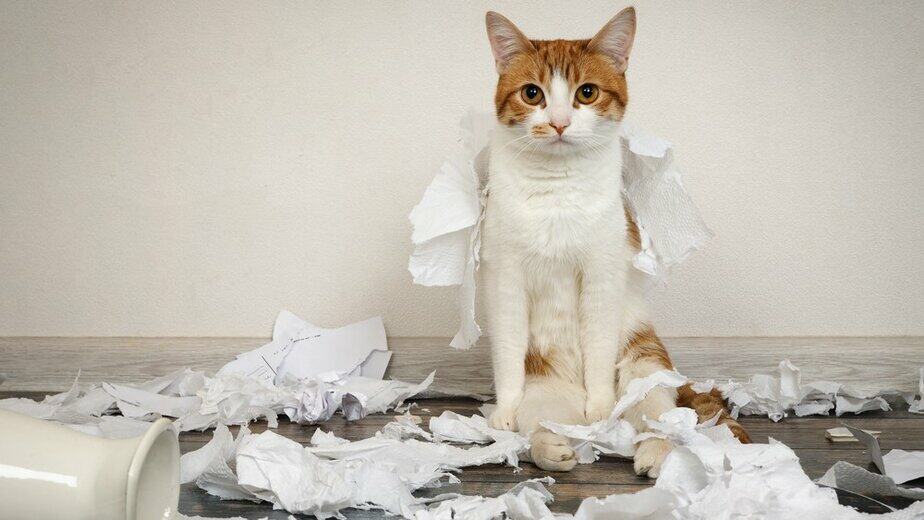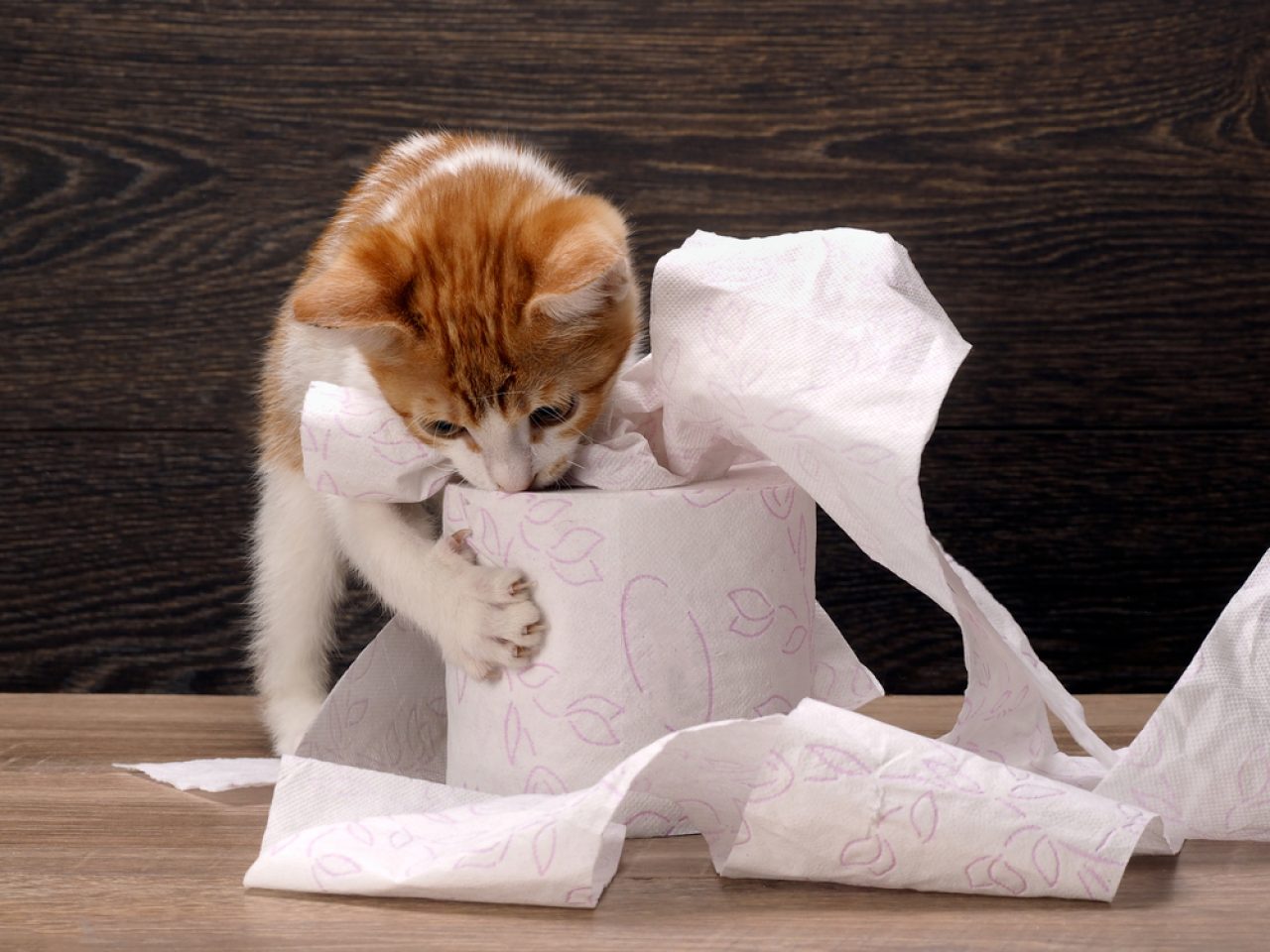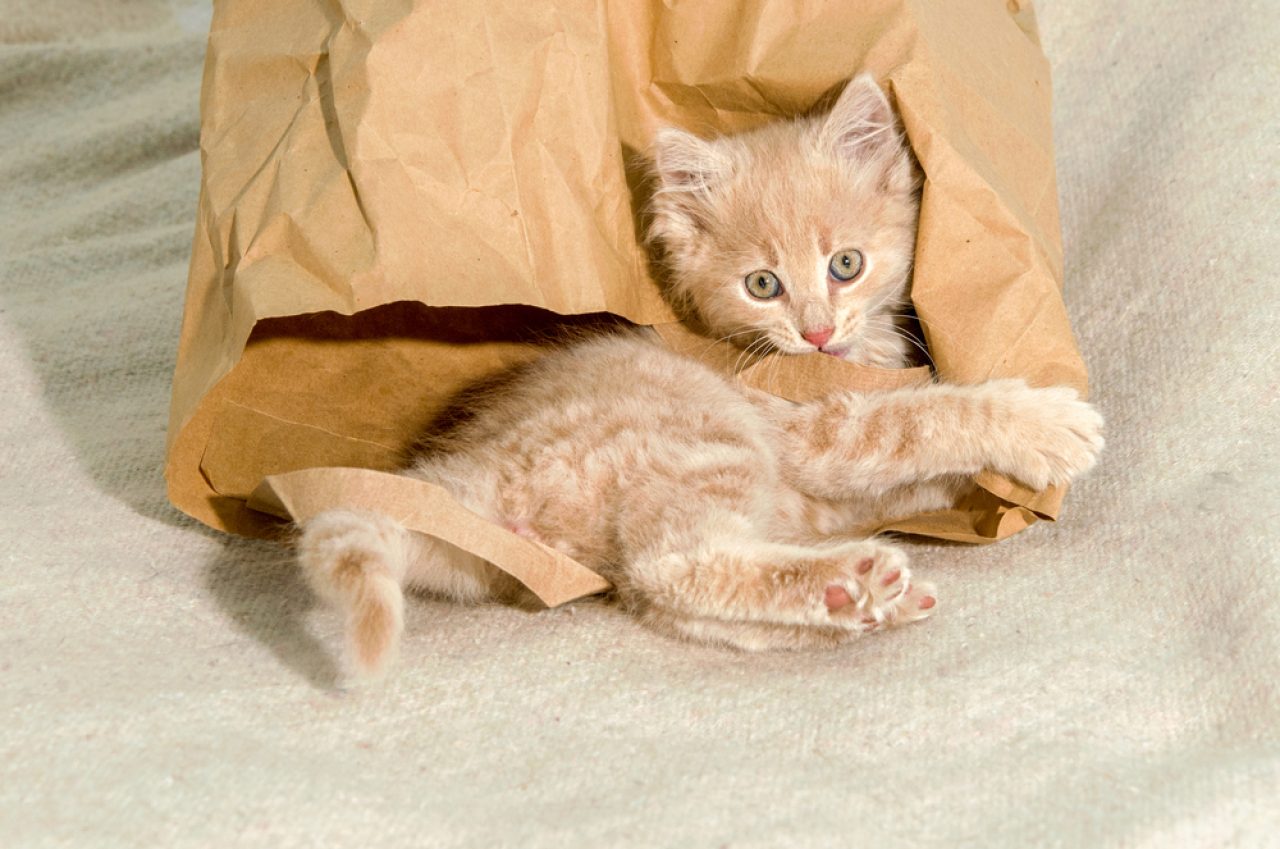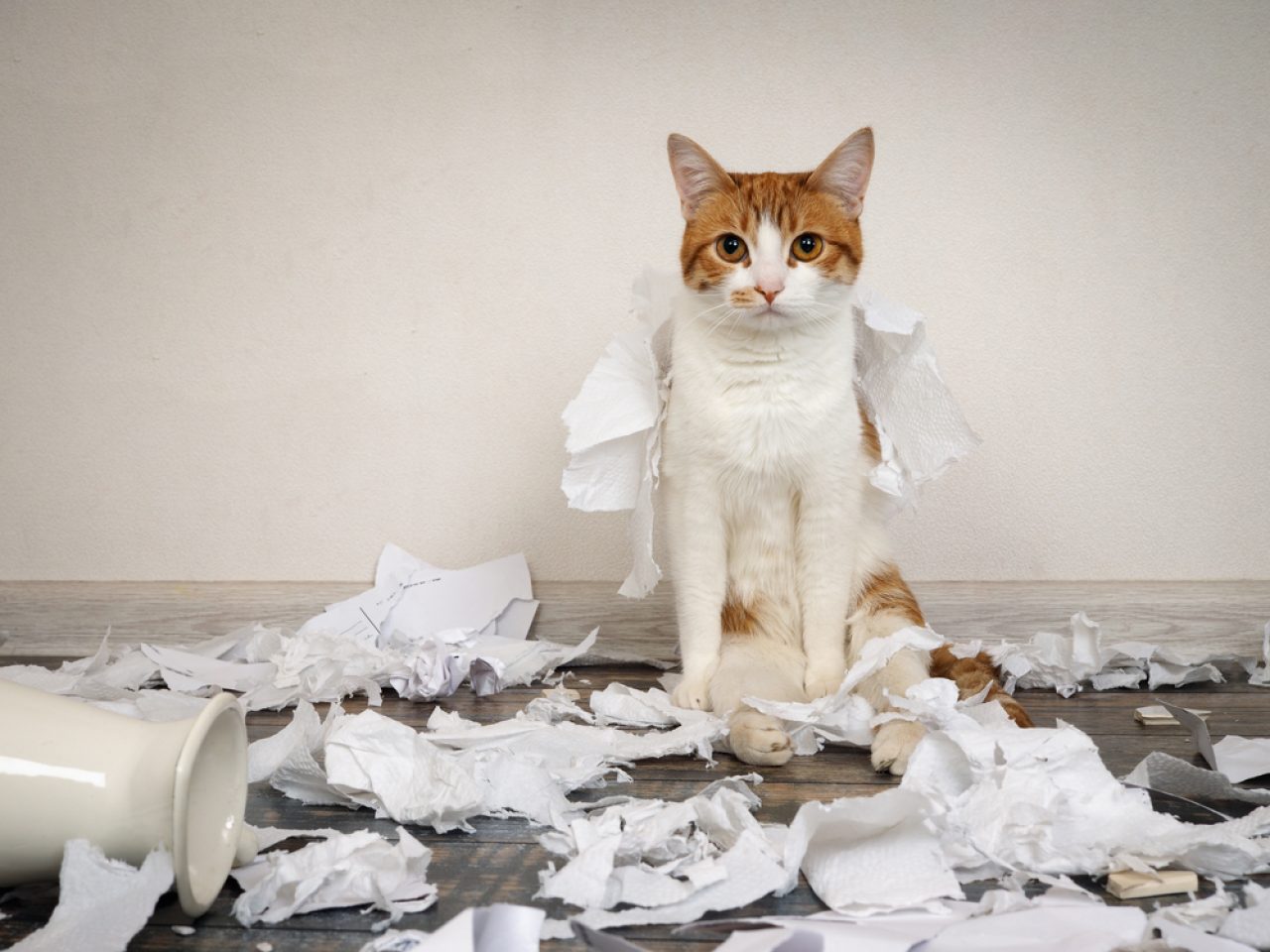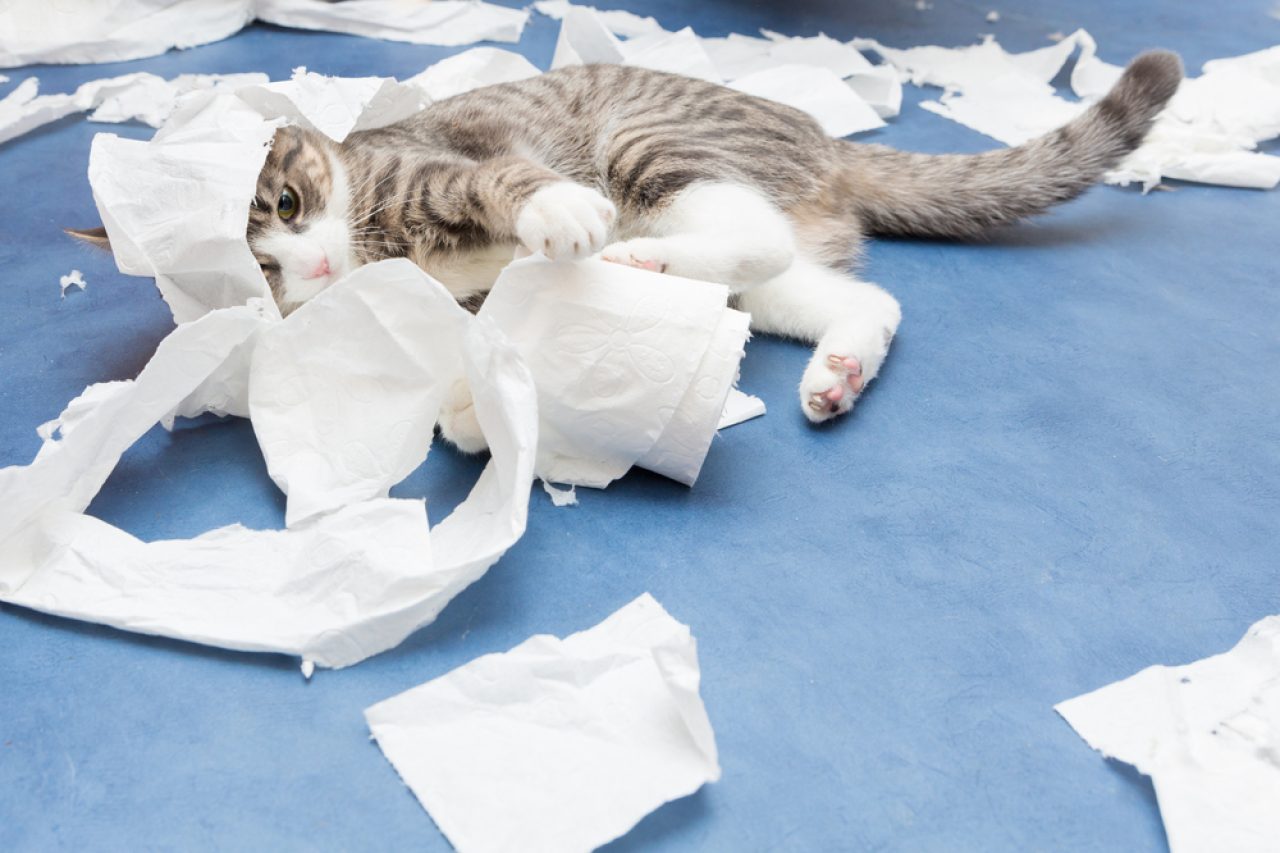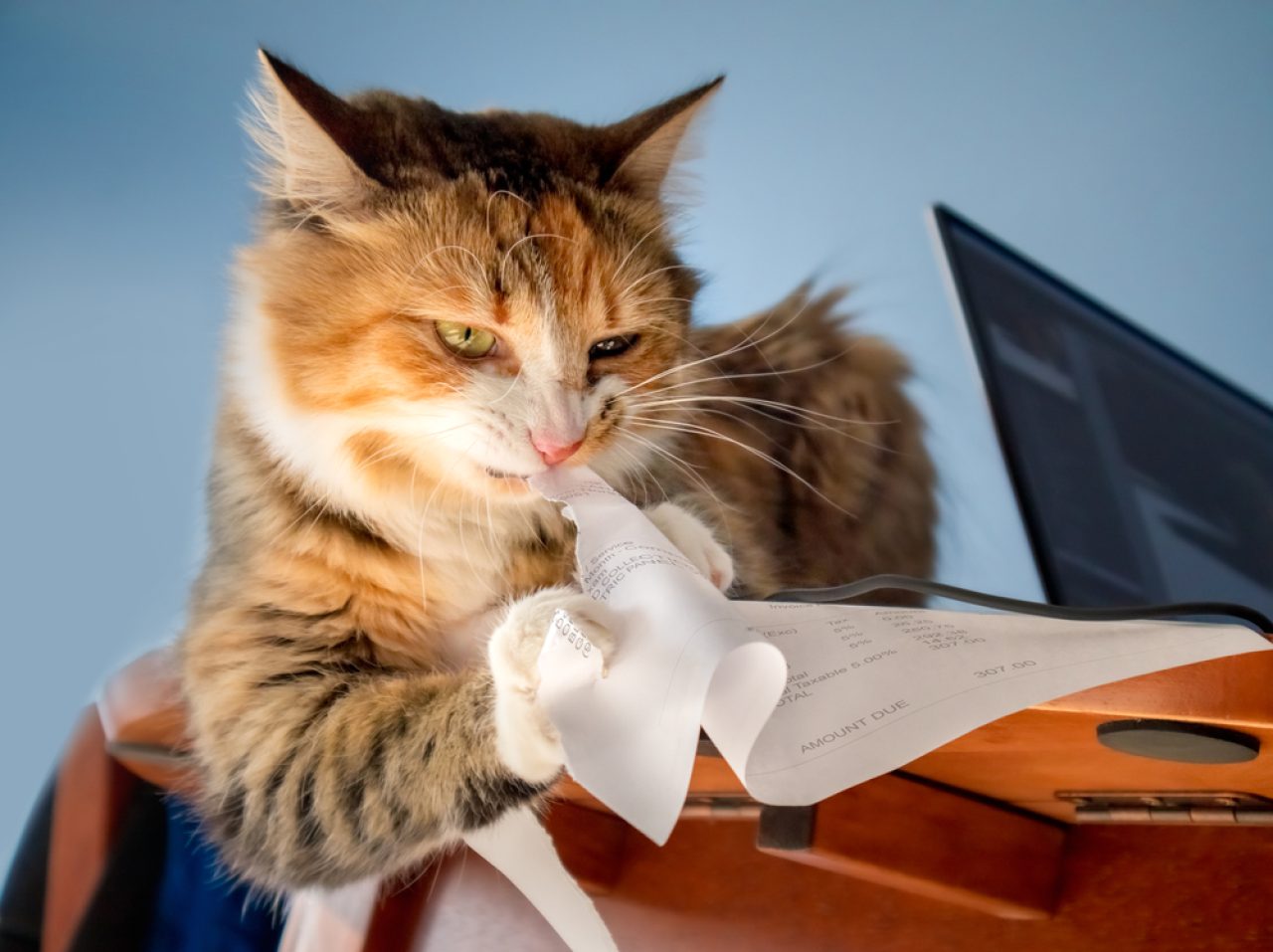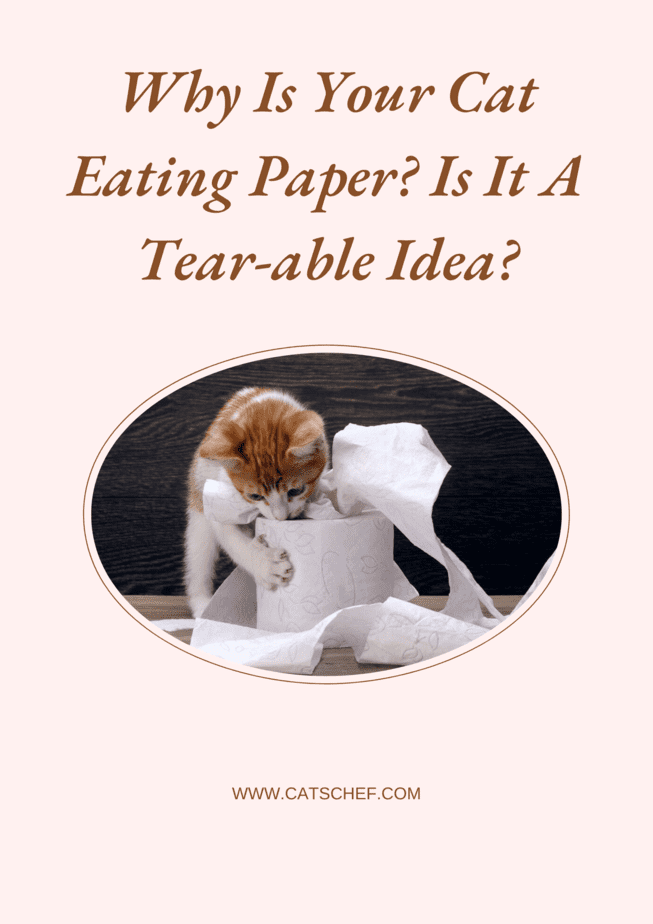📖 Table of Content:
If you are a cat parent, then you have probably spent a lot of time wondering about your fluffball’s strange behaviors and habits. So today, we’re going on a quest to find out why is your cat eating paper.
You’re all too familiar with cats’ obsession with cardboard boxes, paper bags, or papers you’re working on. No matter how many toys you buy her, your little furball will still choose your grocery bag over anything else.
Maybe it’s because they are just too responsible and have to go on a paw patrol to investigate everything. Or maybe they simply see a playmate in everything new you bring to your home.
Either way, you can be sure your cat will approve of your cardboard boxes and paper bags. This can be a good thing for both of you: she encourages your online shopping habits and, in return, receives a new toy every once in a while. A purrfect deal!
And there is also their strange fascination with toilet paper. You’re probably familiar with this one, too. I know I am. Countless times I’ve gone to the bathroom only to find a mountain of shredded toilet paper.
I get it. My kitty is a dangerous predator and the third roll of the day is her most desirable prey. But sometimes I wish she could just stop doing it, you know.
Your cat’s fascination with paper is a very common thing. But in the process of playing with it, sleeping on it, and shredding it, she could also eat a piece of it. Or more.
So, let’s roll on to find out why your cat is eating paper and what to do about it.
Should you worry if your cat eats paper?
As mentioned above, cats eating paper is a rather common occurrence.
Most cats are very playful and like to put their paws (and claws!) on pretty much anything. And you can be sure they will sink their little teeth in it as well. It’s in their nature to nibble on everything that’s accessible to them, whether it be your toes or the edges of a cardboard box.
It’s normal for them to periodically swallow little bits of things they’re nibbling on.
So if you noticed your cat has eaten a piece of paper she’s been playing with, you don’t have to worry. As long as it’s not a three-course paper meal, it’s all good.
Why is your cat eating paper? 5 possible reasons
We’ve established that your cat’s paper-eating habit is nothing out of the ordinary.
But we simply have to wonder why she’s doing it in the first place. Is it just due to her predatory nature and need for hunting? Or is there more to the story?
No need to look for answers anymore! I’ll let the cat out of the (paper) bag and share with you five possible reasons behind paper being on your cat’s meow-nu.
1. Teething or other dental issues
You’re probably familiar with the teething stage. Just like with humans, our fluffballs also grow teeth, and that process can be quite painful.
As the teeth break out, it can cause some irritation and pain to your kitty. And since there is no way for them to tell you, “Hey, I think I’m teething. What should I do?” they are doomed to fend for themselves.
Nibbling on many objects is soothing for their gums and provides them with instant relief. Paper just so happens to be their second choice (the first being our fingers and toes, of course).
But if you have an older cat who has a habit of eating paper, then that might be a sign of other dental issues. Especially if your fluffball is refusing to eat or drink her food.
In that case, you should check if your cat has bleeding gums. If she doesn’t let you check or you’re not feeling comfortable doing it, the best option would be to take your cat to the vet.
2. A lack of nutrients
Did you know that cats can sense if some nutrients are missing from their diet? Yup, it’s true! They are true smarty pants!
This doesn’t mean that your cat craves paper. But she might be trying to satiate her hunger because her usual diet doesn’t provide her with everything she needs.
If you think your cat might be missing some nutrients, try researching what’s the best thing your cat should eat. Or again, consult your vet.
3. Stress or anxiety
Whenever your cat is dealing with some traumatic personal experience, like dissatisfaction with the arrival of a new pet or depression caused by lack of much-needed attention, she will make sure you somehow find out about it.
Cats are creatures of routine, and they are easily subject to stress. In that case, if you spot your cat eating paper, it could be that she’s trying to draw your attention or cope with the stress.
4. No toys around
If you happen to have a busy morning when you don’t even manage to make yourself a cup of coffee, let alone leave your cat’s favorite toys around, don’t be surprised to come home to a shredded paper nightmare.
Even though they spend most of the day sleeping, they still need their playtime. So, if you don’t display toys around your home, they will have to manage on their own.
Don’t be surprised if they choose paper as a toy substitute, especially cardboard boxes, which they can do so much with. They can enter it and use it as a temporary sleeping nest. Or perhaps destroy it, play with the remaining pieces, and in the process, also eat a piece or two.
5. Pica syndrome
Unlike teething or dietary issues, this is unfortunately a more serious medical matter.
Pica syndrome can be defined as a behavioral condition characterized by the urge to eat non-edible items. For your feline friend, those items might include everything they can get their paws on around the house, like your bobby pins, houseplants, electrical wires, or objects made of paper.
Kittens are more prone to pica syndrome than adult cats are, although they can suffer from it as well. Your youngster might outgrow it, but it can also remain as she grows older.
Experts are not completely sure what causes pica, but the reasons we listed above can greatly contribute to its development.
As mentioned before, eating non-edible items – in our case paper – can be innocent if in small amounts. If your cat eats a small amount of paper from time to time, it probably won’t cause her any harm and obstruct her digestive system.
However, pay attention if your cat is eating a large amount of paper. Or even other non-edible objects like house plants, for instance. Some plants are toxic to cats and her nibbling on them might be fatal.
Can cats actually digest paper?
Of course, paper is not meant to be eaten, and it is very hard to digest it in large amounts. But eating small bits of paper here and there would not cause harm to your cat.
Our cats are carnivores and therefore don’t have the enzyme which is involved in the digestion process of cellulose found in the paper. This means that we shouldn’t let our feline companions eat too much of it as it may result in some serious gastrointestinal problems.
But if your cat only occasionally eats shredded pieces of paper, those should be easily passed down the digestive tract and we know how that story ends.
I know it’s hard to keep an eye on your cat 24/7 since we all have other personal obligations, but you should be able to easily notice if your cat has some serious paper-eating problems.
Should you do anything about your cat eating paper? Where to draw the line?
If you’re worried your cat might develop some serious medical issues out of her paper-eating habit, then make sure to change some of the things you do.
If you can, try to make paper hard for your cat to find. At least when you’re not around. And leave her with as many toys as you can, so she always has something to play with.
Many cat toys are actually good for your cat’s gums. So, you could get your cat those cat-chew toys for her to gnaw on.
You can even try to hide some kibbles around the house for her to find and munch on. She will most definitely enjoy it and show you her gratitude when you return home.
Also, invest your free time in playing with her so your furball is never bored. I know it can be hard for you to balance your work and personal life with your kitty’s needs, but that’s just something you have to do to ensure your cat’s happiness and health are never compromised.
Another suggestion is to research the best diet for the specific breed you have. By doing so, you will be certain her meals are packed with all the nutrients she needs.
And at the end, the most important thing you can do if you think your cat could develop some more serious problems is to consult a vet. He or she will surely have all the answers you need (and some you probably didn’t even know you needed).
